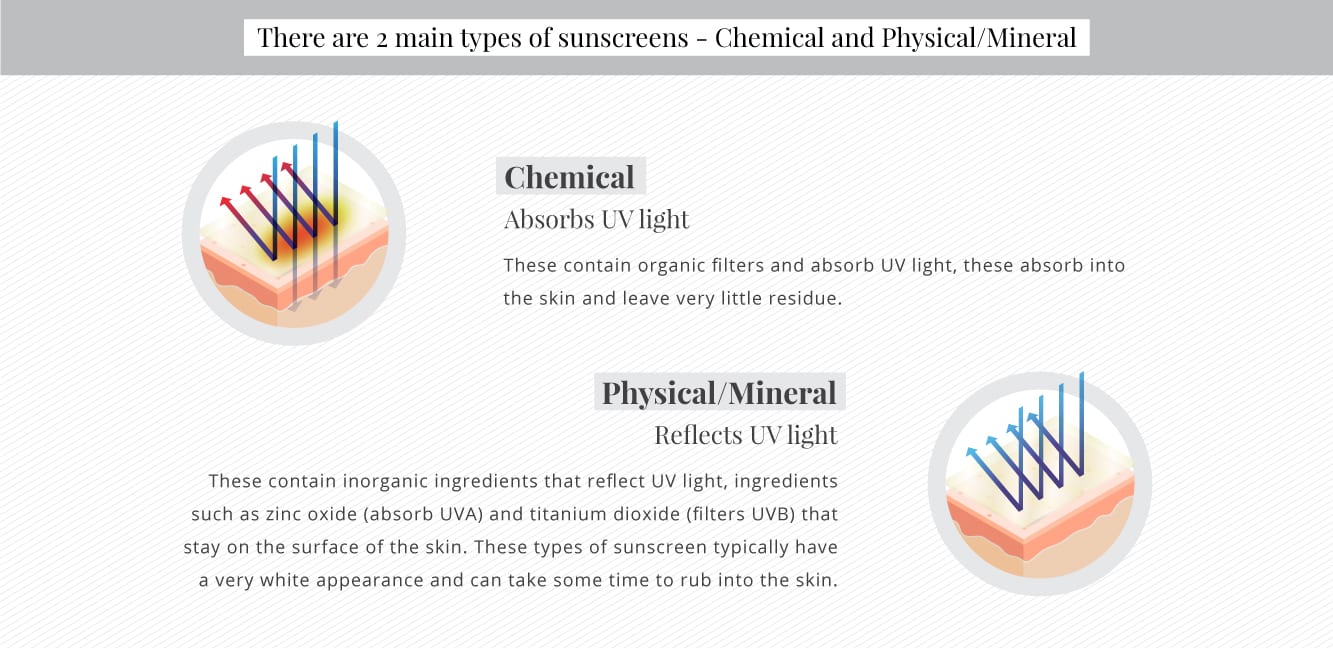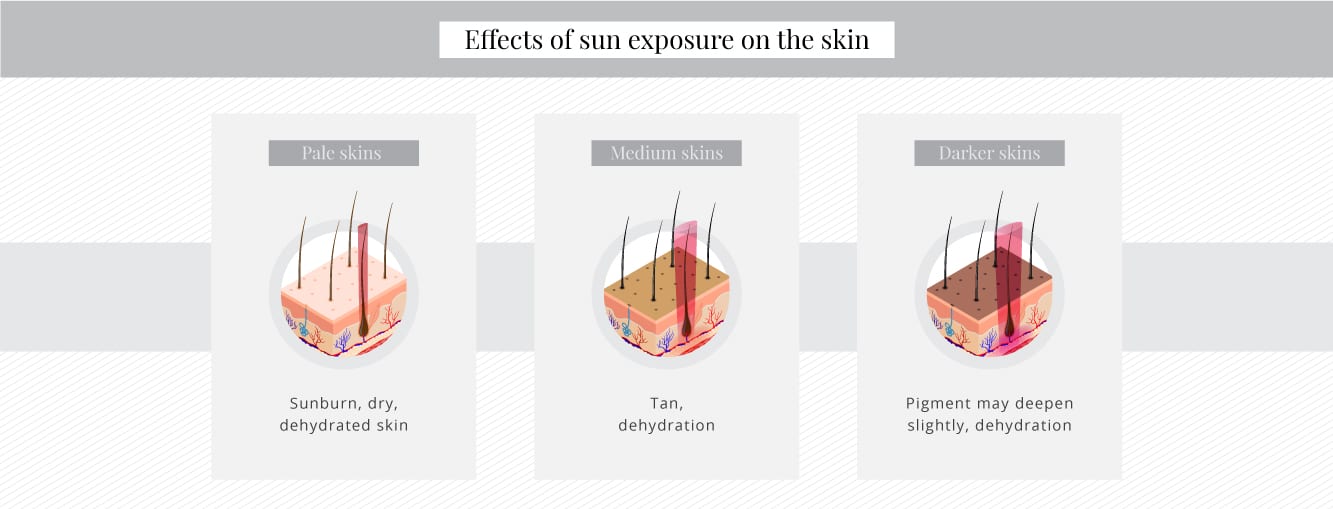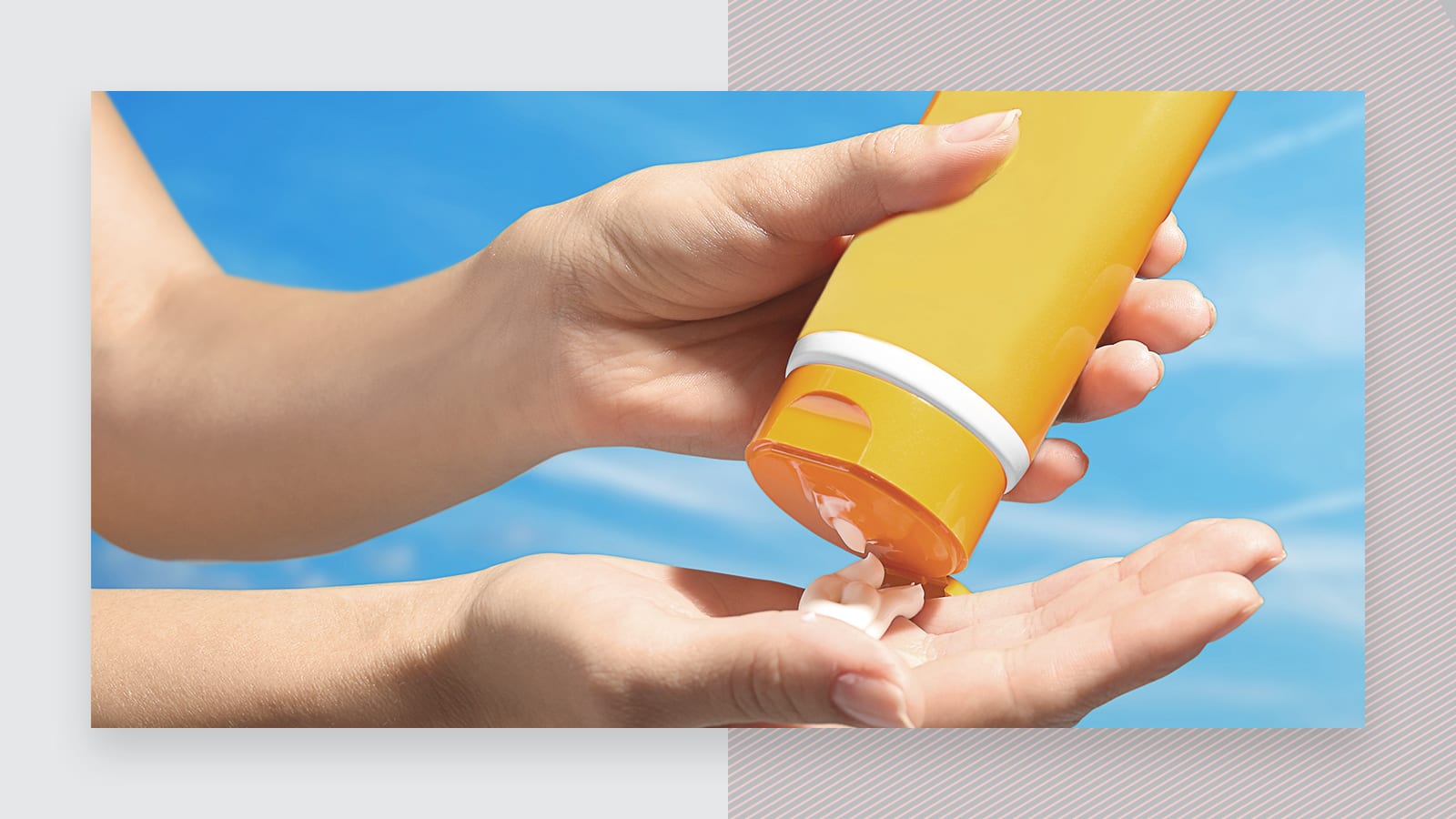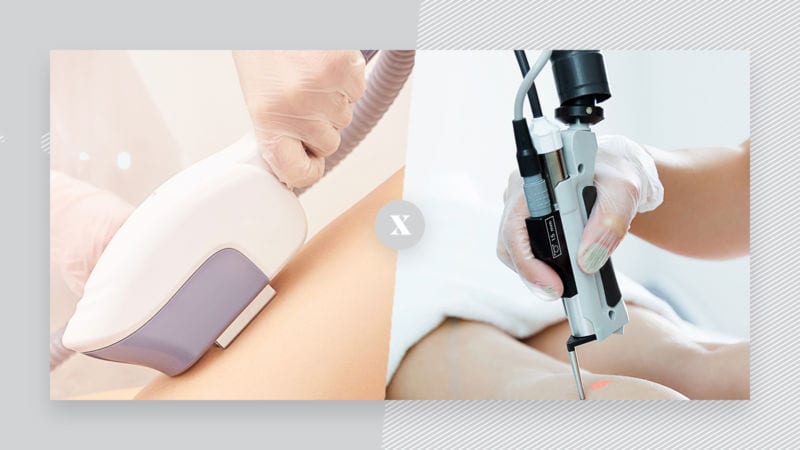SPF and laser hair removal
As we all know too much sun exposure can affect our skin in a negative way. While we need some sun for Vitamin D we also need to protect it against the harmful rays of the sun. Sun damage or photo damage as its also known can result in premature ageing. Exposing your skin to too much sun can result in wrinkles, loss of elasticity, pigmentation and can cause skin to look dull and dehydrated. In more serious cases too much sun exposure can lead to skin cancer developing. UVA and UVB rays from sun exposure are the most damaging to the skin. If you are thinking about starting a course of laser hair removal it is worthwhile investing in a good quality SPF. If your treatment areas are exposed in daylight it is vital they are protected against these harmful rays.
UVA (Ages the skin)
UVA makes up 95% of UV and penetrates deep into the dermis and causes skin damage. These rays speed up the ageing process by stimulating free radicals that damage collagen and elastin. This can also damage the DNA within our skin cells which can lead to skin cancers forming. We are always exposed to these rays even in the autumn and winter months. In order to protect our skin we must use sunscreen all year round.
UVB (Burns the skin)
UVB only penetrates the top layer of the epidermis. This is responsible for stimulating the melanocyte cells within the skin that result in a tan. Exposure to this form of UV usually occurs on sunny days during the summer months. This is what makes your skin burn or go red in the sun. This can cause the skin to become quite thick and make the skin become dehydrated. This can also damage the DNA within our skin cells and over time cause skin cancers.
Skin should be protected all year round. Not just in the summer months and not just when you are undertaking a course of laser. To prevent skin cancers forming, premature aging and overall skin health you need to protect your skin on an ongoing basis. It should be noted that no sunscreen offers 100% protection from the UVB rays.
What is SPF?
SPF or sunscreen as it is more commonly known stands for sun protection factor. SPF indicates protection against UVB rays that cause sunburn. This comes in many different formulations, from creams, lotions, sprays, gel, oil, waterproof, sweatproof to name but a few. SPF is designed to reflect or absorb some of the sun’s UV rays depending on the formulation. Using SPF protects the skin from damage from these rays and helps to prevent premature aging, sunburn and skin cancer. SPF is normally measured in numbers i.e. SPF15, 30, 50. The SPF number tells you how long the sun’s UVB rays would take the skin to burn if you applied sunscreen using the recommended amounts compared to if you didn’t use it at all.
Higher SPF’s block slightly more rays but it should be noted that no sunscreen offers 100% protection from UVB rays. If you are having laser hair removal and your treatment areas are exposed a minimum of SPF 50 is recommended.

It is so important to protect the skin from sun damage. Exposure to UV light can damage our DNA so much that it loses its ability to function correctly. The information stored by our DNA cells can either be no longer read by the body or worse again become so damaged that the cells start to send false signals which may lead to genetic mutations. By using a high grade sunscreen you can not only help prevent this damage you can also help repair any previous damage.
What do the signs and symbols on SPF mean?
The signs and symbols used for SPF give you information about how much protection you can expect from each formulation. However, not all SPF’s are equal. More generic, supermarket/pharmacy brands will not contain the same high grade pharmaceutical ingredients as the clinically proven ones.

Why is SPF needed when having laser hair removal?
SPF is needed when having laser hair removal in order to keep your skin protected. At the start of a course of laser skin in the treatment area will be assessed. A safe setting will be selected on the laser for your patch test. Hair density and hair colour will also be taken into account when choosing what setting to start. If however skin tone fluctuates during a course of treatment settings will need to be adjusted accordingly. Most changes in skin colour occur in the summer months. It is important to minimise these changes if possible while having laser. If skin tone changes considerably this may slow down results as settings on the laser will need to decrease in line with the changes in skin colour.
Avoiding sun exposure as much as possible while you are undergoing laser is recommended. Using a high quality broad spectrum SPF if in the sun and applying regularly will help to protect the skin.
It is important to note that this only applies to the treatment area you are having laser if it is exposed to sun.
How often do you need to apply SPF to your treatment area when having laser hair removal?
For example if having laser treatment on your face you must apply a broad spectrum SPF 50 and reapply every 2 hours if exposed to high levels of sun exposure. You should also try to wear a wide brimmed hat to keep direct sun off the face. However, If your arms exposed during the same time and these are not having laser you could expose these to full sun. We would always recommend using SPF50 and applying every 2 hours if this is the case. If you are swimming or participating in activities that would cause you to sweat this will need to be reapplied directly after.
It is so important to avoid sunburn, this can cause the skin to remain sensitive for long periods of time. It may cause the skin to become very dry and dehydrated and this can cause issues when having laser hair removal. Laser works best on healthy, hydrated skin so to avoid any possible reactions from laser try to limit sun exposure on your treatment areas.

What would happen if you don’t apply SPF to your treatment areas when having laser hair removal?
If SPF is not applied to your treatment area your skin could burn, develop a tan or become dry and dehydrated. Sun affects different skin tones in different ways, very pale skin tones will burn easily and will not develop a tan. However pale skin may become very sensitive after sun exposure if it has not been protected. Medium skin tones will tan very easily and this can be very problematic. Medium skin tones are treated with an Alexandrite laser, this laser targets pigment in the skin rapidly and can cause issues. If the skin tone changes too much it may be unsafe to have a laser treatment until such time as this tan has faded.
Darker skin tones may also slightly deepen in tone after sun exposure. Darker skin is treated with an Nd:Yag laser that is specifically for darker skin so this will be safe. It is important that all skin types are given time to rest after sun exposure. The sun will affect the skin in many different ways so for safety reasons it’s best to wait a minimum of 6 weeks before recommencing laser treatment. A patch test is also vital after any periods of sun exposure regardless of your skin type.

Using SPF will keep your skin safe throughout your course of laser hair removal
If you are considering starting a course of laser hair removal investing in a high quality, broad spectrum sunscreen is recommended. To get the most out of a course of treatment it is best not to expose your skin to sun. This way settings on the laser can be gradually increased for best results and skin will remain a stable colour throughout your course of treatment. SPF will help keep your skin tone stable throughout your course of treatment. However, this does not mean you should expose your treatment area to long periods of sun exposure even if SPF is applied.
What’s the first step on the journey to becoming hair free?
Before you start a course with us we would need to see you for a consultation and patch test. During your consolation we explain how laser works, we assess your skin and hair type and run through your medical history. This assessment will ensure you are suitable for laser. A patch test is also performed for safety reasons. This will allow us to see how well your skin responds to treatment. It also allows you to feel the sensation of laser before you start. We believe it is important to be as upfront and honest with you before you start. Laser is an amazing treatment but it can take time. We make sure you are fully informed before you start with us.



